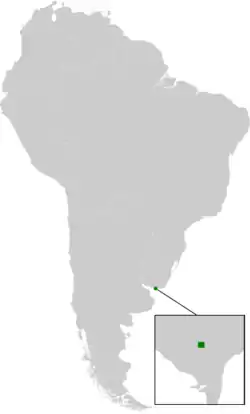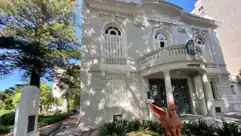Parva Domus
Parva Domus, officially the Republic of Parva Domus Magna Quies (Latin for "small house, big rest") is a self-proclaimed micronational republic surrounded by the city of Montevideo, Uruguay. The nation has served as a civil, cultural and recreational association since its foundation in 1878.[1]
Republic of Parva Domus Magna Quies Micronation | |
|---|---|
 Flag
 Coat of arms
| |
| Motto: Parva domus magna quies Small house, big rest | |
| Anthem: Parva Domus March | |
 | |
| Demonym(s) | Parvense |
| Organizational structure | Presidential constitutional republic |
• President | Bartolomé Angel Grillo |
• Vice President | Milton Marona |
| Establishment | |
• Declared | 25 August 1878 |
| Area claimed | |
• Total | 0.2 km2 (0.077 sq mi) |
| Population | |
• Estimate | 200, ~850,000 historical |
| Claimed GDP (PPP) | 2017 estimate |
• Total | Est. USD 4.8M |
| HDI | 0.94 very high |
| Purported currency | Parva Domus Peso |
Description

Parva Domus is a micronation and self-proclaimed republic with a social and recreational aim. As usual in this type of organization, its citizens employ all sorts of flamboyant appellations and honors. The national government is led by a president and a cabinet of ministers.[2] Its territory hosts a neoclassical residence built in 1919, known as the presidential palace. The property is surrounded by gardens and statues. It is located in the neighborhood of Punta Carretas.
The constitution of Parva Domus admits a maximum of 250 simultaneous citizens. Only men are allowed to become citizens. In 130 years, the republic has had over 843,297 citizens.[3]
Famous Parvenses

Among its citizens, several stand out: Juan Zorrilla de San Martín, Isidoro de María, Eduardo Rodríguez Larreta and Eduardo Fabini.
Important events
The Uruguayan Postal Service issued a postage stamp in 2003 in honor of the 125th anniversary of the Republic of Parva Domus.[4] The micronation hosted a meeting between Uruguayan and Argentinean diplomats during the pulp mill dispute in 2007.[5]
Every year during Uruguay's Heritage Day, the nation opens to the public and offers guided visits of its national museum, gardens, and theatre.[6]
References
- Medina, Federico (19 August 2017). "La República de Parva Domus y Joventango celebran mañana el siglo de La cumparsita". la diaria (in Spanish). Archived from the original on 29 November 2018. Retrieved 28 November 2018.
- www.espectador.com (30 August 2015). "Parva Domus, la pequena republica dentro de Uruguay - Espectador.com". Espectador.com. Archived from the original on 27 November 2018. Retrieved 20 July 2021.
- ElPais. "Nueva fecha patria en la Parva Domus". Diario EL PAIS Uruguay (in Spanish). Archived from the original on 24 May 2019. Retrieved 28 November 2018.
- "Sellos – Correo Uruguayo". www.correo.com.uy (in European Spanish). Archived from the original on 29 November 2018. Retrieved 28 November 2018.
- "Las "gestiones " de Parva Domus" (in Spanish). 20 May 2007. Archived from the original on 20 February 2016. Retrieved 28 November 2018.
- Observador, El. "Viaje a la sede de un país imposible". El Observador (in Spanish). Archived from the original on 29 November 2018. Retrieved 28 November 2018.